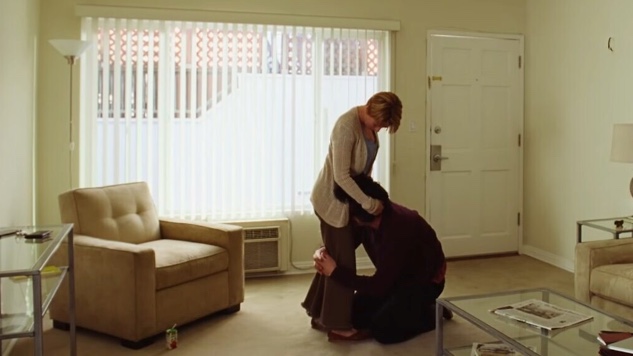I didn’t expect this movie’s main plot to follow the legal process of divorce. To be honest, I thought it would follow their falling in love, too. Be warned, there is none of that kind of heartwarming. But the movie still finds a way to feel loving and even a little uplifting to me.
It’s quite a feat, since the movie really is about the technical process of divorce. It shows the difficulty of finding lawyers, the cost (ironically at the expense of the child’s savings), and the frustrating double levels of communicating through lawyers and face to face. I might think a movie about the legal system would be dry or boring. I didn’t.
I read that the director based it off of his own experience with divorce and his child. I can tell! All the examples of when the kid wanted something different than what his parents had planned felt real, because how frustrating is that? One scene shows Driver flying all the way from New York City to L.A. for a little time with his son, but his son doesn’t feel like going with him. But who are the parents to tell the child what he should want, really? All to do in their position is be patient, but I completely sympathized with them in those scenes about how hard that can be.
The part that felt the most realistic to me, though, was the scene that a lot of people are talking about. It’s the ugliest, most shocking scene, when Adam Driver and Scarlett Johansson (the parents divorcing) are fighting in his apartment, frustrated with each other about this process they’re going through. Both of them are spitting, tears rolling, noses running, yelling their worst at each other at the top of their lungs. The image at the top, here, is from the end of the scene.
Before Driver collapses at Johansson’s feet, he yells the worst thing imaginable at her: “I wish you were dead.” Without the right lead up about Driver’s character, he’d become a monster. With a disgusted response from Johansson, he’d become a monster. It seems like the hardest needle to thread, avoiding vilifying Driver, but the movie does it. I actually feel closer to Driver’s character when he says it.
How is that possible? The movie succeeds so much at convincing me that both of them love each other, and that makes me think that’s why they’re so thrown for a loop, so out of sorts. Sure, they have a different kind of love than what keeps a family together, but some kind of love, nonetheless. He’s grieving the end of their relationship. Driver immediately regrets what he said, is disgusted with himself, and apologizes; Johansson forgives him without hesitation. She knows how he feels. However oddly, they’re on the same page. And the movie ends with an even stronger sense of their being on the same page, despite how sure they are about divorcing.
My review is, please watch this movie. It feels like an authentic account of parents separating. More than that, it highlights parts that other movies and stories aren’t bold enough to try–the ugliest parts. In a world where divorce happens all the time around children, I think we could stand to be generally better emotionally versed about it for these kids. Even prepared to be these parents, to some extent. I’m writing as one of these kids, but I think there are plenty of other ways to relate to these characters. I say we make more movies like this one, making sense of love in marriage and divorce.


